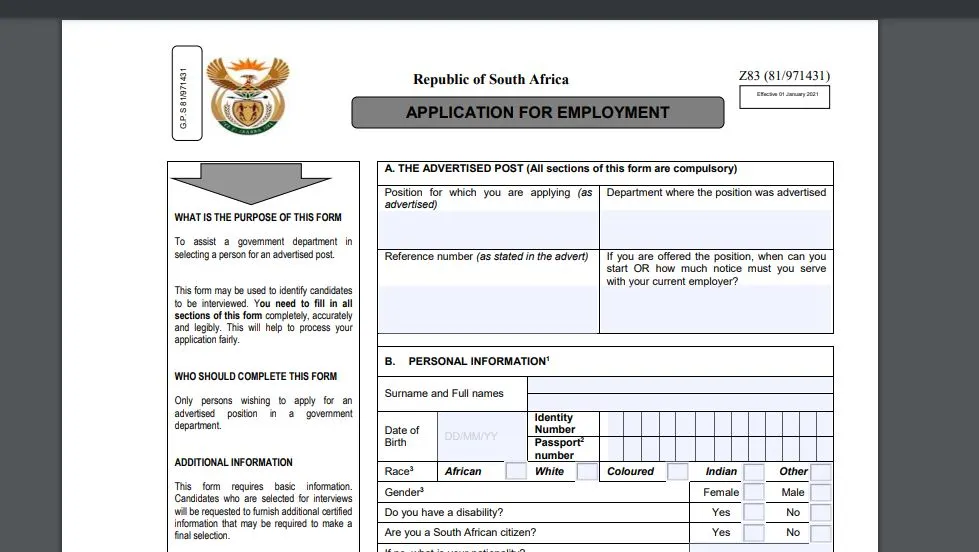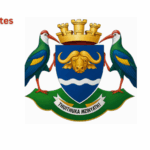
Government jobs offer a wide range of employment opportunities across various departments and sectors. These positions are advertised through different channels, including government websites, the Public Service Vacancy Circular, and the Vuk’uzenzele newspaper. In addition to job vacancies, government departments also offer learnerships and internships to provide valuable training and work experience to individuals.
Latest Government Job Vacancies
-

Re-advertisement – Director: Community Development Services Jobs
Naledi Local MunicipalityProject Management, South Africa -

Re-advertisement: Director of Corporate Services Jobs
Naledi Local MunicipalityFinance / Accounting / Audit, South Africa -

Municipal Manager Jobs
Naledi Local MunicipalityProject Management, South Africa -

SADC Communications & PR Officer Jobs
Peace Parks FoundationStellenbosch, South Africa -

Office Of The Municipal Manager: Corporate Support services Jobs
Mogalakwena MunicipalityLaw / Legal, South Africa -

Accountant: Revenue Jobs
Laingsburg Local MunicipalityFinance / Accounting / Audit, South Africa -

Budget Officer (Internal/External Advert) Jobs
uPhongolo Local MunicipalityFinance / Accounting / Audit, South Africa -

Professional Officer Jobs
City of Cape TownCape Town, South Africa -

Re-Advertisement Superintendent (X3 Post) External Post Jobs
Umzinyathi District MunicipalityKwaZulu-Natal, South Africa -

Specialist :Logistics Management Jobs
Office of the Valuer-GeneralPretoria, South Africa -

Specialist : Demand and Acquisition Jobs
Office of the Valuer-GeneralPretoria, South Africa -

Project Manager Jobs
Office of the Valuer-GeneralPretoria, South Africa -

Assistant Manager : Valuations (11 Posts) Jobs
Office of the Valuer-GeneralPretoria, South Africa -

Specialist : Asset Management Jobs
Office of the Valuer-GeneralPretoria, South Africa -

Senior Specialist: CX/UX Design Engineer – PDE (Modernisation) Jobs
The South African Revenue Service (SARS)Pretoria, South Africa -

Snr Executive Manager: Support Services: HESR50016 Jobs
City of EkurhuleniJohannesburg, South Africa -

Municipal Outreach Coordinator- Magareng Jobs
Electoral Commission of South Africa (IEC)George, South Africa -

Municipal Outreach Coordinator- Siyancuma Jobs
Electoral Commission of South Africa (IEC)George, South Africa -

Municipal Outreach Coordinator – Disability Sector- Sol Plaatje Jobs
Electoral Commission of South Africa (IEC)George, South Africa -

Municipal Outreach Coordinator- Saldanha Bay Jobs
Electoral Commission of South Africa (IEC)George, South Africa -

PMU: Manager Jobs
Sakhisizwe Local MunicipalityProject Management, South Africa -

Senior Manager: CX/UX Design – PDE (Modernisation) Jobs
The South African Revenue Service (SARS)Pretoria, South Africa -

X5 Specialist: CX/UX Design Engineer – PDE (Modernisation) Jobs
The South African Revenue Service (SARS)Pretoria, South Africa -

Executive Director: Planning And Development Jobs
Nelson Mandela Bay MetroProject Management, South Africa -

Mechanical Engineer: Engineering & Technical Services Jobs
Eastern Cape GovernmentEngineering / Technical, South Africa -

Mechanical Engineer :Planning Directorate Jobs
Eastern Cape GovernmentEngineering / Technical, South Africa -

Deputy Director: Integrated Development Planning, Ref No. LG 43/2025 Jobs
Western Cape Local GovernmentCape Town, South Africa -

Deputy Director: Good Governance, Ref No. LG 41/2025 Jobs
Western Cape Local GovernmentCape Town, South Africa -

Civil/ Structural Engineer: Infrastructure Delivery Jobs
Eastern Cape GovernmentBuilding and Construction, South Africa -

Chief Quantity Surveyor (Delivery Directorate) Jobs
Eastern Cape GovernmentBuilding and Construction, South Africa
Staying informed is the first crucial step. Government vacancies are systematically advertised through several official channels to ensure transparency and broad access:
-
The Public Service Vacancy Circular (PSVC): This is the primary and most comprehensive source. Published weekly by the Department of Public Service and Administration (DPSA), it consolidates vacancies circulars from almost all national and provincial departments. It’s accessible electronically on the DPSA website (www.dpsa.gov.za) under “Vacancies” or “Circulars.” Job seekers should check this resource diligently every week.
-
Individual Departmental Websites: Every national and provincial government department maintains its own website with a dedicated “Careers,” “Vacancies,” or “Opportunities” section. Searching for “[Department Name] careers” (e.g., “Department of Health careers”) will lead you directly to their latest listings. This is essential for roles specific to that department.
-
Provincial Government Portals: Each province also has a central portal (e.g., Western Cape Government Jobs Portal, KZN Jobs) listing vacancies across provincial departments.
-
Vuk’uzenzele Newspaper: This government publication frequently features public service vacancies and is distributed widely, particularly in rural areas.
-
Government Gazette: Some senior or specialized positions may be advertised directly in the Government Gazette.
Government Requirements and Eligibility
Eligibility criteria for government jobs are clearly stipulated in each vacancy advertisement. While specifics vary significantly by role and level, common requirements include:
-
Citizenship: The vast majority of positions require applicants to be South African citizens. Proof (a certified copy of your ID) is mandatory.
-
Qualifications: Relevant educational qualifications (Matric/NSC, diplomas, degrees, certificates) are essential. The required level and field depend entirely on the job. Always submit certified copies.
-
Experience: Many roles require proven work experience in a related field. Carefully check the years and type of experience specified.
-
Skills and Competencies: Beyond formal qualifications, specific technical skills (e.g., IT proficiency, project management), soft skills (communication, problem-solving), and inherent competencies (leadership, analytical ability) are often required. Your application must demonstrate these.
-
Driver’s License: A valid driver’s license (often Code 08/B) is required for many field-based or operational roles.
-
Security Clearance: Certain positions, especially those involving sensitive information or finance, may require successful completion of security vetting.
-
Pre-Employment Checks: Verification of qualifications, credit history, and criminal record checks are standard for successful candidates.
For more detailed information about each vacancy, refer to the respective government department’s website.
Types of Job Vacancies in Government
Government departments mirror the complexity of the nation itself, offering an incredibly diverse range of career paths. Here are ten prominent categories of government job vacancies:
-
Administrative and Clerical: The backbone of any department. Roles include Administrative Officers, Secretaries, Registry Clerks, Data Capturers, and Receptionists. Responsibilities range from filing and correspondence to managing diaries and basic financial administration.
-
Finance and Supply Chain Management: Crucial for managing public funds. Roles include Accountants, Financial Analysts, Budget Officers, Supply Chain Practitioners, and Internal Auditors. They handle budgeting, expenditure control, procurement, asset management, and financial reporting.
-
Human Resource Management (HRM): Focused on the government workforce. Roles include HR Officers/Managers, Recruitment Specialists, Labour Relations Practitioners, Training Coordinators, and Payroll Administrators. They manage recruitment, employee relations, performance management, training and development vacancies, and compensation.
-
Information Technology (IT): Essential for modern governance. Roles include IT Support Technicians, Network Administrators, Systems Analysts, Database Administrators, Cybersecurity Specialists, and Software Developers. They maintain critical IT infrastructure, develop systems, and ensure data security.
-
Legal and Policy: Providing guidance and ensuring compliance. Roles include State Attorneys/Legal Advisors, Policy Analysts, Contract Managers, and Compliance Officers. They offer legal opinions, draft legislation and policies, manage contracts, and ensure adherence to laws.
-
Health and Social Services: Directly serving communities. Roles include Doctors, Nurses, Pharmacists, Social Workers, Community Development Practitioners, and Psychologists. They provide healthcare, welfare support, and community upliftment programs.
-
Education and Training: Shaping the future. Roles include Teachers (various subjects and levels), Lecturers (TVET Colleges), Curriculum Developers, Education Specialists, and Training and Development Officers. They deliver education, develop curricula, and provide skills training.
-
Engineering and Built Environment: Developing national infrastructure. Roles include Civil, Electrical, Mechanical, and Chemical Engineers, Town Planners, Architects, Quantity Surveyors, and Building Inspectors. They design, build, and maintain roads, water systems, buildings, and other infrastructure.
-
Security and Law Enforcement: Maintaining order and safety. Roles include Police Officers (SAPS), Correctional Services Officers, Traffic Officers, Military Personnel (SANDF), and Intelligence Analysts.
-
Environmental, Agricultural and Scientific: Managing natural resources. Roles include Environmental Officers, Agricultural Advisors, Scientists (various fields), Meteorologists, and Conservationists. They focus on environmental protection, sustainable agriculture, research, and resource management.
Each position has specific responsibilities and requirements. When applying for a government vacancy, carefully read the job description and ensure that your qualifications and experience align with the position.
How to Apply for Government Vacancies
Applying for government vacancies requires meticulous attention to detail:
-
Locate the Advertisement: Find the vacancy on the PSVC or the specific department’s website. Read it thoroughly, multiple times.
-
Prepare Your Documents: Always have certified copies (within 6 months) of your ID, qualifications (Matric certificate, degrees, diplomas), driver’s license (if required), and any professional council registrations ready. Update your CV comprehensively.
-
Complete the Z83 Form: This is the mandatory application form for most public service positions. Download the latest version from the DPSA website. Fill it out accurately, legibly, and completely. Sign and date it.
-
Tailor Your CV: Don’t send a generic CV. Highlight the experience, skills, and qualifications specifically mentioned in the job advertisement. Use keywords from the ad.
-
Compile Your Application Package: Typically includes the completed Z83 form, your tailored CV, and certified copies of all supporting documents. Ensure everything is in order.
-
Submit Before the Deadline: Strictly adhere to the closing date and time. Submission methods vary: Online portals (increasingly common), email (ensure correct address and file sizes), postal mail (allow ample time), or hand-delivery (to the specified location, often during office hours only). Follow the instructions in the ad precisely. Late or incomplete applications are almost always disqualified.
Advantages of Working for the Government
Despite broader economic challenges, government jobs offer compelling benefits:
-
Job Security: Public sector positions generally offer greater stability and protection against arbitrary dismissal compared to the private sector, especially during economic downturns.
-
Structured Remuneration and Benefits: Salaries follow prescribed scales (e.g., Public Service Coordinating Bargaining Council – PSCBC resolutions), ensuring transparency. Benefits typically include:
-
Comprehensive medical aid schemes (GEMS)
-
Pension fund (Government Employees Pension Fund – GEPF, one of the largest in Africa)
-
Housing allowance/subsidies
-
Generous leave provisions (annual, sick, family responsibility, maternity/paternity)
-
-
Career Progression: Structured career paths and promotion opportunities exist within salary bands and across departments. Performance management systems guide development.
-
Training and Development: Significant investment is made in employee development through internal programs, workshops, bursaries, and support for further studies. Training and development vacancies specifically focus on building this capacity.
-
Work-Life Balance: Government roles often offer more predictable working hours compared to demanding private sector careers, contributing to better work-life balance (though this can vary by department and role).
-
Purpose and Impact: The opportunity to contribute directly to public service, national development, and improving the lives of fellow citizens provides immense intrinsic value.
Government jobs can be rewarding and offer long-term career prospects. Consider these advantages when exploring employment opportunities in the government sector.
Government Learnerships & Internship Programs
Beyond permanent positions, the government offers crucial entry points for skills development:
-
Learnerships: Structured programs combining theoretical learning with practical workplace experience, leading to a nationally recognized qualification (NQF-aligned). Targeted at youth and unemployed individuals.
-
Internships: Fixed-term placements providing recent graduates with practical work experience related to their field of study. Crucial for gaining that initial professional exposure.
-
Bursaries: Financial support provided to students, particularly in critical and scarce skills areas (like Engineering, Health Sciences, Accounting), often with a work-back obligation in the public service after graduation.
These programs are advertised alongside permanent vacancies on the PSVC and departmental websites under sections like “Opportunities for Youth,” “Internships,” or “Bursaries.” They are invaluable stepping stones into department careers.
Preparing for a Government Job Interview
If your application is shortlisted, thorough preparation is essential:
-
Deep Departmental Research: Understand the department’s mandate, strategic goals, current priorities, key legislation it administers, and recent news related to its work.
-
Decode the Job Description: Revisit the specific duties and requirements listed. Prepare concrete examples from your past experience that demonstrate you possess each key skill and competency.
-
Master the Z83 & CV: Be ready to elaborate on any point in your application. Know your work history and qualifications inside out.
-
Anticipate Common & Competency-Based Questions: Prepare for questions like “Why do you want to work for this department?” and “Tell us about a time you faced a challenge and how you overcame it.” Use the STAR method (Situation, Task, Action, Result).
-
Prepare Thoughtful Questions: Asking insightful questions about the role, the team, or departmental challenges shows engagement and genuine interest.
-
Professional Presentation: Dress formally and conservatively. Punctuality is non-negotiable. Demonstrate professionalism and respect throughout the interaction.
By following these tips, you’ll be better prepared to showcase your abilities and suitability for the job during the government job interview process.
Statistics
South African Employment Landscape: Q1 2025 Analysis with Government Salary Insights
Employment Trends
Quarterly Changes (Dec 2024 → Mar 2025)
| Metric | Value (Dec 2024) | Value (Mar 2025) | Change | % Change |
|---|---|---|---|---|
| Total Employment | 10,653,000 | 10,579,000 | -74,000 | -0.7% |
| Full-time Employment | 9,503,000 | 9,448,000 | -55,000 | -0.6% |
| Part-time Employment | 1,150,000 | 1,131,000 | -19,000 | -1.7% |
Year-on-Year Changes (Mar 2024 → Mar 2025)
-
Total Employment: -95,000 (-0.9%)
-
Full-time: -40,000 (-0.4%)
-
Part-time: -55,000 (-4.6%)
Industry Breakdown: Quarterly Job Losses/Gains
(Top Contributors to Q1 2025 Changes)
TRADE: ██████████████ (-52,000 jobs)
COMMUNITY SVC: █████ (-17,000 jobs)
MINING: █ (-4,000 jobs)
MANUFACTURING: █ (+2,000 jobs)
CONSTRUCTION: █ (+5,000 full-time)
BUSINESS SVC: █ (+10,000 part-time)
Earnings Analysis
Quarterly Changes (Dec 2024 → Mar 2025)
| Component | Dec 2024 | Mar 2025 | Change (R) | % Change |
|---|---|---|---|---|
| Gross Earnings | R1.03 tr | R983.1 bn | -R47.3 bn | -4.6% |
| Basic Salaries | R890 bn | R881 bn | -R9.4 bn | -1.1% |
| Bonuses | R112 bn | R75.8 bn | -R36.5 bn | -32.5% |
| Overtime | R27.7 bn | R26.3 bn | -R1.4 bn | -5.1% |
Year-on-Year Changes
-
Gross Earnings: +R26.1 bn (+2.7%)
-
Basic Salaries: +R33.1 bn (+3.9%)
Government Sector Stability & Salaries
Key Q1 2025 Context
-
Community Services (includes government roles) lost 17,000 total jobs but showed overtime payment growth (+R value).
-
Public sector stability contrasts with private sector volatility:
-
Trade sector: 52,000 job losses (worst performer).
-
Government resilience: Structured salaries, benefits, and lower layoff rates.
-
Government Salary Benchmarks (Monthly)
Typical Ranges for Key Roles (2025)
| Position | Entry-Level | Mid-Career | Senior | Benefits Package |
|---|---|---|---|---|
| Administrative Officer | R18,000–R25,000 | R25,000–R35,000 | R35,000–R45,000 | Pension, medical aid, leave |
| Project Manager | R35,000–R45,000 | R45,000–R60,000 | R60,000–R80,000 | Housing allowance, training |
| Educator | R25,000–R30,000 | R30,000–R45,000 | R45,000–R65,000 | School holidays, development |
| IT Specialist | R30,000–R40,000 | R40,000–R55,000 | R55,000–R75,000 | Tech allowances, remote work |
Note:
Average Monthly Earnings (All Sectors): R28,289 (Feb 2025), +5.6% YoY.
Government salaries typically exceed private sector averages for mid-senior roles due to:
Pension (GEPF): 13%+ employer contribution.
Medical Aid (GEMS): Subsidized up to 70%.
Job Security: Near-zero layoffs during recessions.
Forecasts & Implications
-
Government Hiring Outlook:
-
2025-26 Public Sector Expansion: 15,000+ new roles in health, education, and infrastructure.
-
Critical Vacancies: Nurses, IT security, engineers, educators.
-
-
Private Sector Risks:
-
Trade/Retail: Continued automation-driven job cuts.
-
Bonus/Overtime Cuts: Indicate cost-containment strategies.
-
-
Salary Projections:
-
Government: 6-7% annual increases (PSCBC agreements).
-
Private Sector: 4-5% increases (weaker bargaining power).
-
Conclusion
South Africa’s Q1 2025 employment decline (-0.7% QoQ) underscores private sector fragility, while government roles remain a stability anchor. With average monthly earnings at R28,289 and public sector benefits adding 20-30% in value, government careers offer competitive security. Job seekers should prioritize:
-
Public Service Vacancy Circular updates.
-
Sector Resilience: Health, education, infrastructure.
-
Skills Alignment: IT, engineering, project management.
Data Source: Statistics South Africa (QES Q1:2025).
Government Salary Reference: PSCBC Resolution 1 of 2025, GEPF benchmarks.
Was this helpful?
23 / 6
#Administration #Application Forms #ARC #Bursaries #Careers #Departments #Documents #DPSA #Education #Human Resource #Human Resources #Internships #Jobs & Vacancies #Learnership #Learnerships #Learning #Municipalities #National Government #Provincial Government #Vacancies